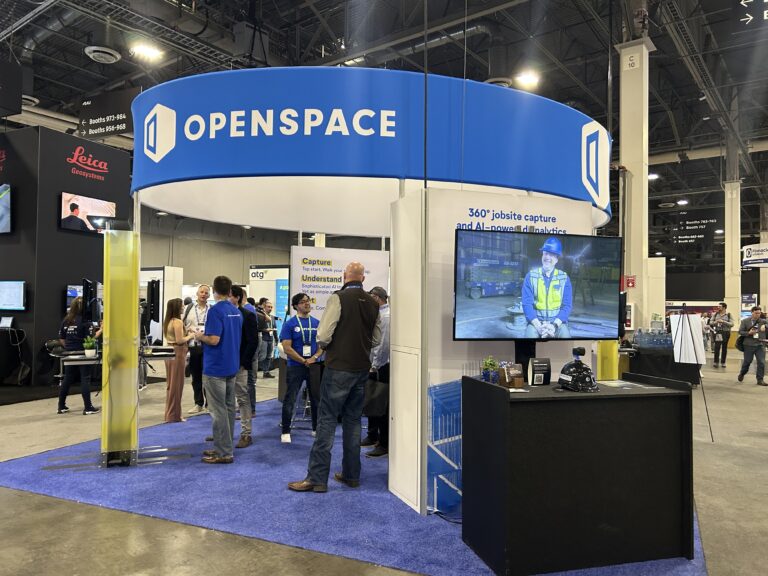Why Company Culture Matters, and How We Cultivate It at OpenSpace
November 7, 2022

At OpenSpace, we focus a ton of effort on continually improving our products in order to make builders’ lives easier. Creating the best possible platform for reality capture and analysis is our goal, but that doesn’t mean that all of my energy as CEO is spent on our product roadmap. In fact, my energy is primarily spent on building the company itself.
What does “building the company” mean, exactly? Well, for a software company, the company is the sum of its people: we don’t own lots of machinery, equipment, or property. Our company is our people. That means building the company is all about finding the right people—and building the right type of culture that lets our people be successful. It’s a near truism to state that we couldn’t have built OpenSpace into the company it is today without our incredible team. But the team doesn’t exist in a vacuum. The key to building a strong company is having the right team AND the right company culture—a culture that shapes the team and its efforts, and a team that in turn shapes and improves the culture.
To put it simply: creating the culture for your company isn’t part of running your company, it is running your company.
Before I go on, one thing. Much ink has been spilled on defining the term “culture” as it pertains to building companies. I won’t be able to match some of the wisdom already out there. But for me, one useful way to define “culture” is that it is just the set of norms a given group of people share: the stated (or more often unstated) “rules” that dictate what is rewarded, and what is frowned upon. Oftentimes, a strong culture forms when a group of people simply agrees on the meaning of 5-10 words: what is meant by “commitment”, or “goal”, or “plan”—that sort of thing.
With that in mind, I’ll share a little more about what the culture we’ve worked to create at OpenSpace looks like. My hope is that explaining our stance will give more insight into what it’s really like to be part of our team (we are hiring!), and provide a perspective that may benefit others who are building companies, too.
Why culture is important
A company’s culture has a tremendous impact on its success. As Peter Drucker famously quipped, “culture eats strategy for breakfast.” Yet one of the biggest mistakes people often make is not being intentional about setting a culture until they’re already a 50 (or 500)-person team. Culture doesn’t wait to be invited into existence: whether you’ve deliberately set a cultural tone or not, your business will have one—so you might as well pay attention to it from the very outset.
How do you go about building a corporate culture that will make your company successful ? This is where things get tricky: unfortunately, there is no one right, magic formula for the perfect company culture. What works well for OpenSpace isn’t necessarily what will work best for another company.
A good way to go about determining what culture fits your business is to think about what your core values are. This is admittedly super basic. But actually thinking through what you want your core values to be—when it is just the set of founders, at the very outset—can be really powerful. And of course, you have to find ways to actually use them!
By the way, what is a core value? For us, core values are neither mystical maxims that all are expected to memorize, nor are they something thought of once and then forgotten by the team. They are just tools—heuristics, really—for making fast decisions in information-poor environments: something every company will need to do in order to be successful. If your team understands the core values, then good things will happen. They will tend to make faster decisions by invoking a core value to make a call as opposed to belaboring a decision with too much analysis and debate. They won’t need to run every decision up the chain because they know the core values are agreed-to tools to make decisions. Last, the decisions will tend to make sense to the entire group, cutting off unnecessary disagreement. You will move faster, and more coherently. All good things!
At OpenSpace, our core values are: 1) Simplify everything; 2) Expect excellence from each other; 3) Done is better than perfect; 4) Don’t take yourself too seriously. Once we established those core values, we had to commit to really using them. We write them down, share them with new hires, and use them as guiding principles in our business decisions. If things go well, the core values will take on a life of their own, and you will find your team invoking them whenever they are needed.
For instance, if we’re faced with a tough choice as a leadership team between two options, we might ask ourselves, “Which is the simpler solution?” Since simplicity is one of our core values, then we should hold ourselves to that standard in everything we do. When used like this, core values have the advantage of improving transparency and trust in decision-making throughout the company, because everyone understands the prisms through which choices are made.
Once the core values are established, it’s important to acknowledge that a good culture doesn’t mean that there are never any bad days. We’re all human, and everyone has their ups and downs. And you’ll make mistakes: sometimes you will be inconsistent in how you apply your values. And core values don’t prevent tough times. But they can help your company navigate through them successfully. In practice, this means that when the going gets tough, everyone understands what’s expected of them, understands the rationale behind the decisions that are made, and knows what the company’s commitment to them is, too.
Here’s a closer look at our four core values, and how they help shape our culture. As our company continues to grow, we’re invested in making sure that our culture scales right alongside our headcount.
OpenSpace’s core values
- Simplify everything: If you’re familiar with the OpenSpace platform, the idea that we really value simplicity won’t be a surprise. Life and work are full of unavoidable complexities, so anywhere we have space to make things cleaner and easier, we want to take that opportunity. It’s easy in the technology industry to be wowed by bells and whistles, but the most complex answer isn’t always—or even often—the right one. Most important: making things simple is hard. This core value helps us stave off those seemingly ubiquitous forces that tend to make people make things complicated.
- Expect excellence from each other: Great companies are a team environment where people can trust each other to do good work, to be supportive colleagues, and to honor the business’s core values. If you achieve this, people can be freed to do work more autonomously, without micromanagement overhead. Expecting excellence doesn’t just mean delivering quality project results; it also means that we need to treat each other with respect. When you can trust and rely on your teammates, you can accomplish so much more together, much more efficiently.
- Done is better than perfect: We have a lot of incredibly talented individuals at OpenSpace, and it’s not uncommon for these high-achievers (myself included) to sometimes tend toward perfectionism. But a startup is a fast-moving, iterative environment where making progress and maintaining momentum are more important than spending hours perfecting one small cog of the wheel. That doesn’t mean we don’t value quality, nor that we won’t give projects our best effort. It means that we choose to go farther by being strategic with how we spend our time every day. Put simply, getting a draft out in one day and getting feedback is almost always better than spending a month on a plan on your own to get it “perfect.” Short feedback loops beat long loops, almost always! As my friend Bre Pettis once said, “done is the engine of more.”
- Don’t take yourself too seriously: This is personally one of my favorites. But it’s more than just permission to crack jokes on Slack. It’s actually quite strategic: it applies to how we think about risks. There are some industries where you need an incredibly low risk tolerance, like air traffic control or cardiothoracic surgery. But most startups are a different beast: you don’t want people to be so afraid of making a mistake that they are timid and defensive. Stressed people — and stressed organizations — tend to make defensive decisions. They tend to protect something that they think they have. But startups don’t have a hell of a lot to protect! We are small, resource-poor companies, in the grand scheme of things. So our goal is to grow. That means playing offense. And it means you’ve got to find ways to not let stress become the dominant psychological state for your company, even though the work is hard and unpredictable. Allowing people not to take themselves too seriously helps create an environment where a mistake isn’t the end of the world, where you can make fun of yourself when you screw up and just move on, and where everyone is empowered to maintain forward progress—and take calculated risks. Freaking out is almost always counterproductive. If you don’t take yourself too seriously, you’ll freak out less. And that’s a good thing.
Well, I hope that was helpful! (If it wasn’t, sorry. Reading stuff on the internet is a hit-or-miss activity.)
By the way! One not-so-subtle point of posts like this is to communicate to the job market what kind of company we are and attract the right type of people to apply to work here. So if these core values resonate with you, visit our Careers page to learn more about our open roles.

